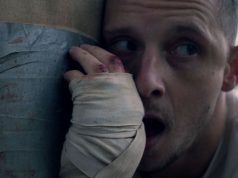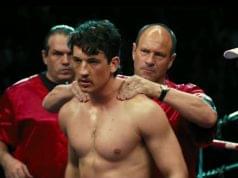Speaking of being blindsided, “The Blind Side” is good enough to make me almost forgive Sandra Bullock for “All About Steve,” which is the worst movie I’ve seen this year. I wasn’t sure I’d ever get over that debacle, and yet here we are, barely two months later, and already I’m smiling favorably upon Ms. Bullock again. Why, I barely even remember “The Proposal” anymore! Sandy, your healing powers are amazing.
“The Blind Side” is a very sweet and warmhearted drama that’s based on an inspiring true story but doesn’t suffer too much from the emotional manipulation and trite platitudes that often plague such films. Based on Michael Lewis’ book, it was adapted and directed by John Lee Hancock, who made the equally pleasant baseball drama “The Rookie,” as well as “The Alamo” (which, ironically, has been forgotten). Both “The Rookie” and “The Blind Side” demonstrate that a film can stick to a formula and still be worthwhile.
Bullock plays Leigh Anne Tuohy, a wealthy Memphis interior decorator and socialite whose husband, Sean (Tim McGraw), owns several fast-food franchises. Their children, teenage Collins (Lily Collins) and precocious middle-schooler S.J. (Jae Head), attend the tony Wingate Christian School, where an out-of-place new student has recently been admitted on scholarship. His name is Michael Oher (Quinton Aaron), and he stands out because he is black, not to mention being roughly the size of an outhouse. His father is gone, his mother is on crack — he is essentially homeless. He got into Wingate because someone saw the potential for him to be a boon to the sports program.
Leigh Anne, always on the lookout for an opportunity to be a good Christian, sees Michael walking alone at night, not dressed for the cold weather, and learns he has no place to sleep. She invites him to stay on the couch, only briefly wondering whether it’s a good idea to invite a near-stranger into the family’s home. Michael, your standard “gentle giant,” humble and soft-spoken, is astonished by the kindness.
Michael’s stay with the Tuohy family becomes extended, and then semi-permanent, and Leigh Anne starts to learn about the boy’s fiercely protective instincts. In spite of the stereotypes about his size and race, he has no particular talent for football — until he comes to view his teammates as his family, whereupon he sees his job as left tackle as a solemn obligation to protect them from all attackers. Heaven help you if you are an opposing player trying to get at Michael’s quarterback.
This isn’t a sports movie, though, any more than “Friday Night Lights” is a sports TV show. As with that series, the emphasis is on the human story behind the game, and in particular on the selflessness and decency exhibited by the Tuohys and their new family member. It’s always heartening to see people in movies behave kindly and nobly toward their fellow men, especially when the filmmaker has enough restraint not to lay the sentiment on too thick. This allows us to feel the natural warmth that emanates from the story without feeling like we’re being forced to feel it.
Some of the details are disappointingly uninspired, though, notably with the two-dimensional “villains.” Leigh Anne’s shallow socialite friends are predictably appalled that she would visit Michael’s mother (Adriane Lenox) in the part of town where the scary black people are. Michael’s old associates in that neighborhood don’t like his uppity new lifestyle where he goes to school and doesn’t sell drugs and stuff. The players and fans of Wingate’s football rivals are, of course, racist jerks. Why, the father of the player who’s meanest to Michael on the field happens to be sitting right behind Leigh Anne in the bleachers! And he’s mean, too! Come on, movie. In football terms, I believe this is known as piling on.
Maybe this is an overcompensation for the fact that the story doesn’t really have a lot of conflict. Michael bonds well with both of his adoptive siblings, as well as Leigh Anne and Sean. He makes friends at school. His grades, which are atrocious to begin with, need to improve, but there’s not much suspense there, especially with a tutor (Kathy Bates) and a kindly teacher (Kim Dickens) on hand to support him. When a rift develops between Michael and Leigh Anne, it arrives right on schedule, at the point in the movie where the rift always is. It feels obligatory, like the movie can’t wait to resolve it and get back to normal.
Hancock’s screenplay has some genuinely funny and intelligent lines (“Who’d have thought we’d have a black son before we knew a Democrat?” Sean says to Leigh Anne), and in general does not pander to the audience. But it’s the very likable performances that give the film the most resonance. Bullock is entirely believable as Leigh Anne: strong-willed but not pushy, and Christian without being a religious nut (a rarity in films). She works well with Quinton Aaron, in his first big movie role; they appear to have a real connection. I also like young Jae Head as Michael’s pint-sized adoptive brother, who takes the lead in negotiating when college recruiters come calling.
You wouldn’t have guessed that what appears to be a generic inspirational drama — starring Sandra Bullock, in a pronounced Southern accent, helping an unfortunate black teenager — would turn out to be as sophisticated and respectable as this. There are so many ways that these films usually go wrong, and this one mostly avoids them. Like I said, blindsided.
B (2 hrs., 8 min.; )





